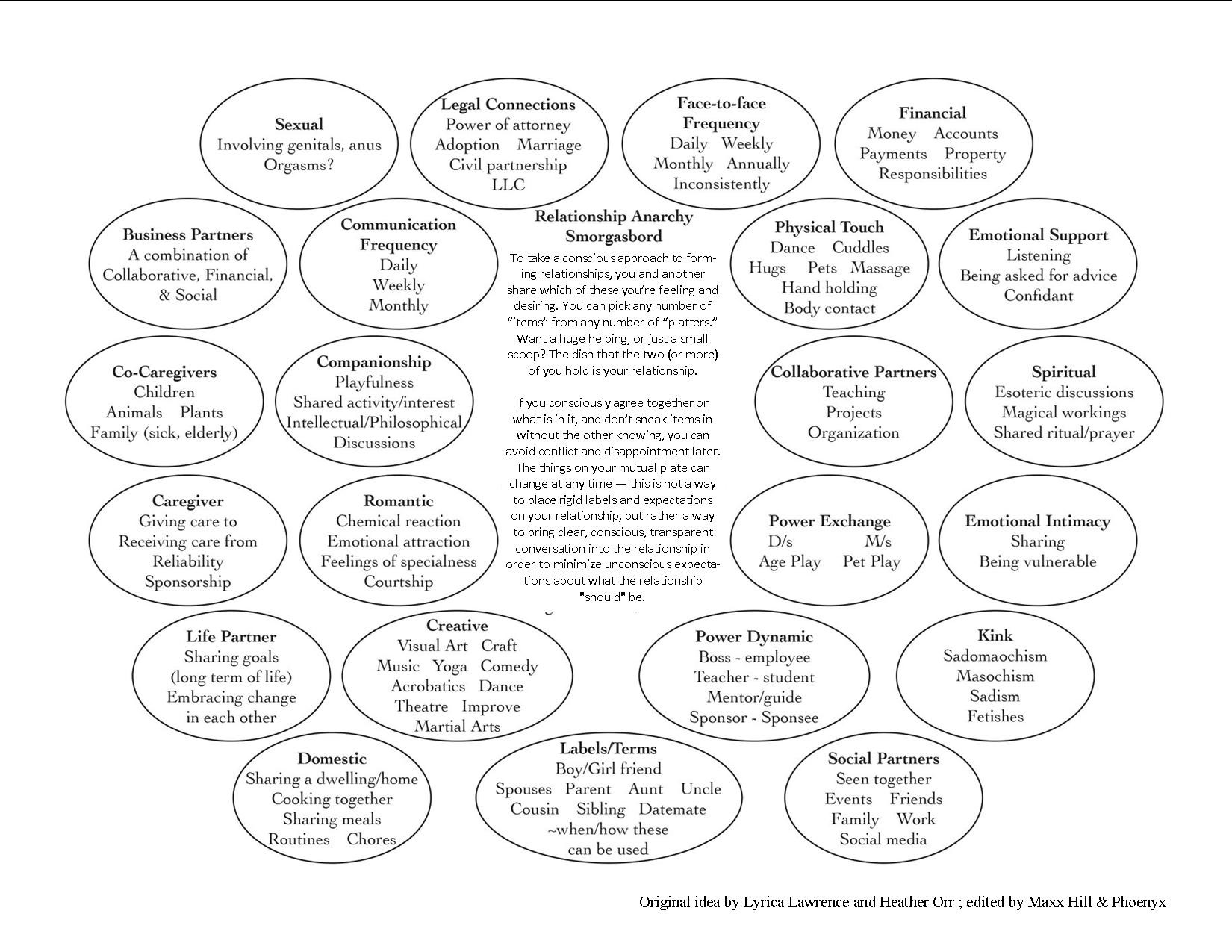Relationship Anarchy theory and practice
What Is Relationship Anarchy?
 Relationship Anarchy is a relating philosophy and practice based in self-awareness and personal responsibility that honors autonomy, authenticity, and adaptability. It is a practice of consciously aligning intentions with others rather than unconsciously projecting assumptions and abiding by societal expectations.
Relationship Anarchy is a relating philosophy and practice based in self-awareness and personal responsibility that honors autonomy, authenticity, and adaptability. It is a practice of consciously aligning intentions with others rather than unconsciously projecting assumptions and abiding by societal expectations.
(Phoenyx definition)
Pillars of the Philosophy
Below are five philosophical pillars of Relationship Anarchy, followed by axioms that are the foundations of these pillars:
HONORING AUTONOMY, BOUNDARIES, & PERSONAL RESPONSIBILITY
- I can only know one experience
- It’s not possible to fully know why another makes certain decisions for themselves
- There are no objective “shoulds”
- Only I can choose my emotions, decisions, and actions in response to external circumstances
- I am responsible for deciding and communicating my boundaries, continuously
- No one can “make me feel” a certain way
- Every person is on an individual journey, following their unique drive and bliss
- If I truly desire happiness and wellness for myself and those I love, I will cultivate and encourage our freedom to act authentically (as long as it doesn’t violate another’s personal boundaries)
- With conscious, intentional communication, I can encourage voluntary cooperation without using coercion
REDUCING EXPECTATIONS & ELIMINATING ASSUMPTIONS
- I am solely responsible for any expectations and assumptions I choose to have
- I am, therefore, solely responsible for any disappointments resulting from those expectations
- Even when others give me expectations, or project their expectations, I don’t have to take them
- I am not entitled to anything
- Anything others offer to me is a gift, for which I have the opportunity to be grateful
- I can ask without the expectation of receiving
- Just because something happens one way one time, does not mean it will happen that way again
- Respecting autonomy and boundaries of others means getting clear, ongoing, informed consent
FLEXIBLE AGREEMENTS VS. RULES WITH PUNISHMENTS
- All contracts and promises are breakable / non-binding
- I can choose not to form breakable contracts
- Obligation that is not consciously agreed to often leads to resentment and other negative emotions
ADAPTABILITY (WILLINGNESS TO ACCEPT CHANGE)
- The only constant is change
- We cannot know the future
- Boundaries, circumstances, priorities, and preferences change over time
- There’s always something to be grateful for
- The more I look for it, the more quickly I will find it
AUTHENTICITY & EMPOWERED SELF-EXPRESSION
- I would like those I relate to to know the real me
- Not people-pleasing means I might face more rejection
- But, I will find more truly resonant souls if I am courageous enough to bare mine
Relationship Anarchy Smorgasbord
Click to enlarge
Join the Conversation
 If you're in the Portland, Oregon area, gather with others exploring the Relationship Anarchy philosophy and practice. Join the Meetup Group here.
If you're in the Portland, Oregon area, gather with others exploring the Relationship Anarchy philosophy and practice. Join the Meetup Group here.
 Read and participate in discussions on the global Relationship Anarchy Facebook group.
Read and participate in discussions on the global Relationship Anarchy Facebook group.
The Book
 Check out www.liberating.love for updates on Phoenyx's soon-to-be-published book: "Relationship Anarchy: Liberating Love." You can also follow the progress of the book and related workshops on the Liberating Love Facebook page.
Check out www.liberating.love for updates on Phoenyx's soon-to-be-published book: "Relationship Anarchy: Liberating Love." You can also follow the progress of the book and related workshops on the Liberating Love Facebook page.
Private Coaching
If you're interested in private, one-on-one coaching, support, or reflection from Phoenyx, please send a message! Local and remote coaching are both possible.
